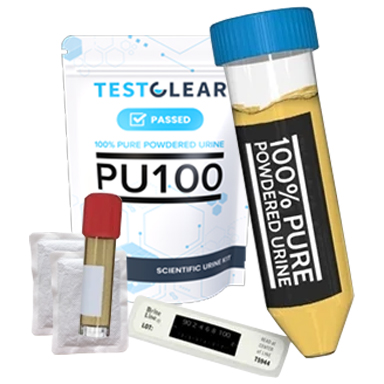A next-day drug test is hard to pass, but synthetic urine is a great solution. The only question holding you back is, “Does synthetic urine expire?”
Luckily for you, the short answer is no. Synthetic urine doesn’t expire in the traditional sense. But the long answer is a little more complex, with influential factors like exposure to oxygen, sunlight, and brand.
If you’ve been thinking of the many ways your urinalysis can go wrong, you’re at the right place. Keep reading to learn more about the expiry and shelf life of synthetic urine.
 |
#1 Choice in 2024
Urine Simulation Kit |
|
Understanding Synthetic Urine Expiry
Before we get into the logistics of synthetic urine and its expiry, let’s get one thing clear: you can’t pass a urine drug test with expired synthetic urine. If you suspect your product is expired before taking a urine drug test, it’s wise to buy a new one.
Synthetic urine is laboratory-engineered, so it does have an expiry date, but not in the conventional sense. In most cases, you can expect a two- to three-year shelf life.
Synthetic Urine vs. Natural Urine
Human urine consists of 95% water, 2% urea, 0.1% creatine, and 0.3% uric acid. Synthetic urine has a similar composition since it’s made of urea, creatinine, and pH levels, with each ingredient formulated to remain stable over time.
The marker of a successful synthetic urine sample is its ability to mimic real urine in terms of consistency, smell, and color. According to this 2016 study, synthetic urine also needs to have certain markers you can find in natural urine. That includes:
- Creatinine levels at 25–140 mg/dL
- Specific gravity ranging from 1.001 to 1.030
- pH levels between 4.2 and 7.5
Plus, it needs to be adequately hydrated. Even though real pee is made up of 95% water, there is such a thing as too much water in urine. Unusually diluted urine is a telltale sign your urine sample is not authentic.
In some scenarios, brands may incorporate caffeine and uric acid into the synthetic urine to make it appear natural. While this is a near-foolproof way to pass your fake sample as real, it drastically reduces the shelf life of synthetic urine. Caffeine and uric acid are not shelf-stable, making your fake pee sample expire faster.

Shelf Life of Synthetic Urine
There’s no simple way to answer the question, “How long does synthetic urine last?” Its shelf life is influenced by various factors, including:
Exposure to Heat
“Does urine expire after heating?” is a more common question than you may think. While it doesn’t instantly expire upon heating, its shelf life does decrease drastically. In fact, most samples don’t last longer than an hour after heating.
This is mainly because of the chemical reactions that occur when urea, a major component of synthetic urine, is exposed to heat. Plus, the main factor that makes fake urine shelf-stable is the lack of microorganisms. Heat can facilitate the growth of these microorganisms.
Exposure to Extreme Conditions
On the other end of the spectrum, synthetic urine can also go bad if it’s frozen. The solution’s entire structure changes once ice crystals form inside the sample. There’s no guarantee it will perform the same after thawing.
Storing Practices
The shelf life of synthetic urine can also decrease if you don’t store the sample as instructed by the manufacturer. That typically involves storing the sample in a dark, room-temperature area. Temperature control prevents chemical reactions from occurring inside the sample.
Other than that, the container should be airtight, or the synthetic urine will be exposed to heat, light, and oxygen. Your urine sample mustn’t be exposed to sunlight since UV light can break down certain compounds in synthetic urine, leading to changes in color, odor, and chemical composition. This process is known as photodegradation.
Exposure to Oxygen
Synthetic urine can become unstable when exposed to oxygen. It goes through a process called oxidation, gaining electrons and triggering certain chemical reactions. Oxygen can also lead to the formation of free radicals (highly reactive species with unpaired electrons). Lastly, exposure to oxygen allows for bacterial growth and pH changes.
Synthetic Urine Manufacturer
The shelf life of synthetic urine majorly depends on the brand you’ve chosen. Most manufacturers offer a shelf life ranging from one to three years. This is also true for brands like Quick Fix Plus and Upass – both products have a high success rate when it comes to passing drug tests.
 |
#1 Choice in 2024
Urine Simulation Kit |
|
Detecting Expired Synthetic Urine
After “Does fake pee expire?” the next question is naturally, “How do you know when fake pee has expired?” Luckily, there are a few indicators you can keep in mind.
- The sample may be discolored, darkened, or cloudy. It may even be greenish or reddish in some cases.
- The sample may have particles, sediment, or cloudiness.
- The sample may have an unusual smell, like ammonia. In some cases, it may smell sour or rancid.
- The sample may have a pH level lower than 4 and higher than 8.
- The sample may have a thick or unusual consistency.
If you can check the boxes for any of these indicators, the sample is most likely expired. It’s crucial to note that you cannot pass a drug test with expired synthetic urine, even if the expiry date was only the day before. You must ensure your sample is usable before going through with the drug test.
A usable sample will have a light yellow color, water-like consistency, pH levels between 4 and 7.5, and a mild smell. If you have doubts about any of the above-mentioned indicators, it’s always better to buy a new one than risk your job or reputation.
Synthetic Urine’s Reheating & Multi-Use
When it comes to synthetic urine and reheating, two questions come up most often.
- How long does synthetic urine last once heated?
- Can you reheat synthetic urine multiple times?
The shelf life of synthetic urine reduces drastically upon heating. In fact, it’s best to use the sample one hour after microwaving it. That’s because heat causes multiple changes within the solution’s structure, rendering it unstable.
Firstly, heat affects the shelf-stability of urea, the main component of synthetic urine. It undergoes a process called hydrolysis – the breakdown of urea into ammonia and carbon dioxide. The more this process escalates, the more the sample’s urea levels will change, leading to negative test results.
Plus, exposure to heat allows for microbial growth within the synthetic urine, which instantly makes the sample unstable. Sure, it may look and smell more like real pee after microorganism growth, but it will not help you pass a drug test.
More importantly, synthetic urine should have a pH level between 4 and 7.5 to mimic real pee. Heat can cause pH levels to drop or skyrocket, making the sample expire faster.
Correct Reheating and Multi-Use
Luckily, you only need to worry about these effects if you reheat and reuse your synthetic urine incorrectly. You may find sources encouraging you to use a microwave for convenience, but it’s not the correct way. You can’t control the exact temperature of the sample when using a microwave.
Instead, it’s better to use the heating mechanism your urine sample came with. This way, the sample’s temperature won’t exceed 38℃ or 100℉. You can also achieve the same temperature using a heating pad.
If the expiry date isn’t near, you can keep reheating the urine sample for multi-use, but it’s not recommended. Most samples are around 2 to 3 oz, which means you can use them two to three times. Drug tests require a minimum sample of 1 oz.
Maximizing Synthetic Urine’s Lifespan
Now that you know the answer to “How long does synthetic urine last?” it’s time to find out ways you can make it last longer than expected.
- Proper Storage: First, you must remember to store the sample according to the manufacturer’s instructions – in a cool and dark place. But that doesn’t mean the refrigerator; opt for a dry and clean cabinet. This prevents exposure to sunlight and other contaminants.
- Airtight Containers: Make sure the sample container is airtight and sealed until use. Exposure to oxygen can break down the components inside the sample and trigger chemical reactions. For multi-use, remember to close the container tightly before storing. If the bottle is unopened, most samples can offer a shelf life of up to 2 years.
- Validity Testing: If you buy the synthetic urine sample from a trusted source, it will most likely come with a validity strip test. This test checks the sample’s pH levels and creatinine levels to ensure it can help you pass the drug test. Remember to run the test a day before your test.
- Temperature Control: Do not store the synthetic urine sample in a cold or hot environment. Heat causes urea breakdown, while lower temperatures allow for microbial growth and crystal formation. In the fridge, microorganisms can start growing within the sample in just under 24 hours.
FAQ: Synthetic Urine Longevity
Here are the answers to the most frequently asked questions about the longevity of synthetic urine.
How Long Is Synthetic Urine Good for Once Opened?
Once opened, synthetic urine is typically considered usable for up to 24 to 48 hours. You can make it last longer by storing it in an airtight container at the right temperature, but it still won’t make the sample last for multiple uses, as claimed by many sources.
How Long Does Upass Last After Opening?
Upass doesn’t provide specific information about its shelf life, but most users claim that it lasts a few hours after opening and heating. You can run it through a validity test to check its viability for a drug test.
Does Quick Fix Plus Go Bad?
Yes, Quick Fix Plus will go bad two years after it’s been bottled. The expiry date will come sooner after the bottle has been opened or reheated.
 |
#1 Choice in 2024
Urine Simulation Kit |
|
Conclusion on Synthetic Urine Lifespan
While synthetic urine does not expire traditionally, it can become non-viable for drug testing. Its stability is mainly affected by exposure to heat, extreme conditions, and incorrect reheating. As long as you store and reheat it correctly, a fake urine sample can last up to 2 years.

